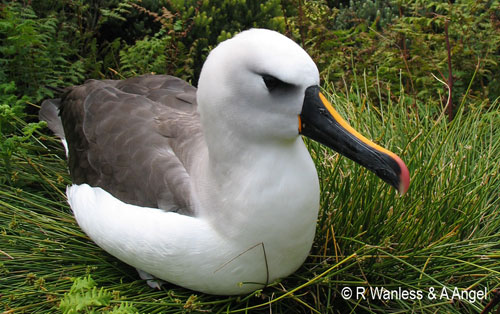For many years South Africa has leased a small area of land above Transvaal Bay on the United Kingdom’s Gough Island in the South Atlantic to operate a weather station. The station is relieved once a year in September/October, currently by the S.A. Agulhas II, research and supply vessel of the South African National Antarctic Programme (SANAP).
Previous leases have tended to run for a decade but now a new lease for approximately sixteen acres (c. 6.5 ha) of the island, signed this month in Cape Town, is to run for 20 years. This period will allow surveys and long-term demographic studies of four species of ACAP-listed albatrosses on Gough to continue with logistic support from South Africa (click here). Critical management activities, such as alien plant and “killer mouse” eradication programmes, will also be able to continue. The new lease is to operate in terms of the current management plan for the Gough and Inaccessible Islands World Heritage Site, which will ensure that the island remains well-protected.
The lease was co-signed at a ceremony in the Parliamentary complex on 17 September by Ms Nosipho Ngcaba, Director-General of the South African Department of Environmental Affairs and Mr Christopher Trott, the British Consul General to South Africa on behalf of the Administrator of Tristan da Cunha, who in turn represented the Governor of the UK Overseas Territory of St Helena, Ascension and Tristan da Cunha. In terms of the new agreement, South Africa will offer transport for a maximum of 40 passengers and 400 tonnes of cargo to Tristan da Cunha (under which Gough falls) once a year. The 20-year period will give South Africa an opportunity to build a new base to replace the ageing buildings on the island.

Atlantic Yellow-nosed Albatross on Gough Island
Photograph by Ross Wanless & Andrea Angel
With thanks to Trevor Glass for information. Taken in part from a South African press release.
Research on ACAP-listed species on the outer islands of Tristan da Cunha is funded by the UK's Overseas Territories Environment Programme and the Darwin Initiative Programme via the Royal Society for the Protection of Birds and by the FitzPatrick Institute, University of Cape Town. It is conducted with the support and approval of the Tristan Conservation Department and the logistic support of the South African Department of Environmental Affairs.
John Cooper, ACAP Information Officer, on Gough Island, 25 September 2013

 English
English  Français
Français  Español
Español